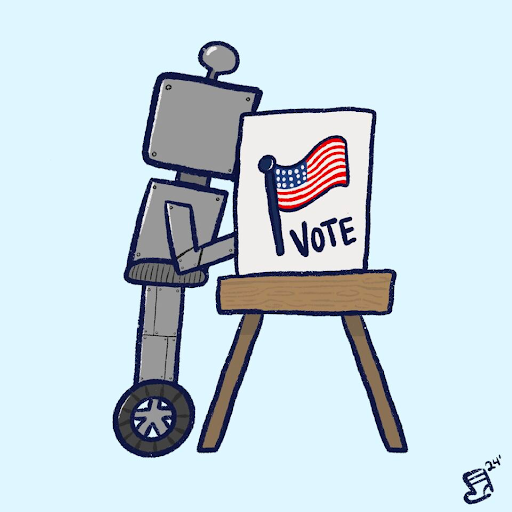With over 50 countries holding elections this year for a combined population of 4.2 billion people heading to the polls, 2024 is the biggest election year in history. The stakes are high, but there’s a wild card that might shake things up: artificial intelligence.
Between the occasional scarily convincing deepfakes, fake audio recordings and other misinformation schemes, AI has been at the helm of potentially disrupting the integrity of elections across the world. On the other hand, AI also has the potential to improve election processes like never before by aiding election officers in speedily verifying anomalies in voter lists and ballot signatures, or scanning paper ballots and reducing the time to report results.
Pima County Recorder Gabriella Cázares-Kelly has tread lightly in deciding how and when to use artificial intelligence.
“I’m very conscientious of AI, and we’re just now learning how some of these services can be useful in our work,” Cázares-Kelly said.
Cázares-Kelly leads the Pima County Recorder’s Office, which primarily focuses on early voting and registration. Specifically, the office is responsible for maintaining and updating over 630,000 voter records, managing voter registration and setting up and running early voting sites.
One way the Recorder’s Office is beginning to implement AI into its election process is through the addition of the Agilis Machine.
“[The machine is] a scanner and sorter, and it has the ability to identify [early voting or mail-in ballots] that are missing a signature,” Cázares-Kelly said. “The machine helps us immediately identify which envelopes don’t have a signature, as opposed to the time-consuming process of going through each envelope individually.”
Cázares-Kelly also noted that the Agilis Machine has additional abilities as well, although they likely won’t be ready to deploy in this election cycle.
“We could also have the Agilis do a first pass at signature verification,” Cázares-Kelly said. “If the signature that we have on file and the signature in the envelope are wildly different, the Agilis could segregate that and we could review it and contact the voter much earlier in the process.”
AI is aiding the Recorder’s Office in smaller ways as well, particularly in the development of its phone tree. Cázares-Kelly said her team used recordings of her voice to generate AI audio for the office’s phone tree, circumventing the hours-long recording sessions this process would normally take while still allowing the office to use an authentic, human-sounding voice that is reflective of the Pima County community.
The Pima County Elections Department, which works alongside the Recorder’s Office and handles election-day voting and tabulating or counting ballots, has taken a similar and even more reserved response when it comes to implementing AI in its processes.
“Our processes are pretty set in how we do things, as far as getting ballots made and counted or tabulated,” said Jeremy George, a staff member at the Pima County Elections Department. “None of these things are really AI or internet-based.”
Another implication that AI might have on elections is generating increasingly convincing misinformation. Earlier this year in Slovakia, an AI-generated recording of a top candidate boasting about how he’d rigged the election spread online days before voters would head to the polls. The candidate ended up losing, and although it is unconfirmed whether or not the fake recording swayed the results, examples like these highlight the dangers of AI if left unchecked.
To avoid falling prey to this sort of misinformation, George highlighted the importance of consulting trusted sources.
“If you have a question about elections, go to our website, the Secretary of State’s website or any other of these trusted .gov places,” George said.
Cázares-Kelly emphasized how one of the primary goals of her office was to combat this kind of misinformation and she encouraged people to seek out official information from her office’s website and other official Pima County avenues.
“We’re working hard to establish ourselves as the source of truth for our community by making information accessible, putting it in plain language so that everybody can understand and just trying to demystify the process,” Cázares-Kelly said.
Her office is also taking strides to combat misinformation through other avenues as well. In particular, it is supporting AZ SB1515, a bill that would make it a crime to generate a deepfake of an election officer that is deliberately meant to spread misinformation.
Despite the threats that AI might pose, it seems like the Pima County community is more ready to embrace and take advantage of AI and technology in election processes than it might seem.
Cázares-Kelly recalled responses she received after announcing her office’s use of the Agilis Machine, where she utilized cautionary language in her description of the machine’s capabilities in preparation for the backlash she thought she’d receive.
“I actually received responses like ‘Why wouldn’t the machine use AI? If this was available, why would she pay for this machine?’” Cázares-Kelly said. “I was kind of leaning into that hesitation of AI because I thought that was the audience I was talking to, but then I found out it’s actually the complete opposite.”
Experiences like these highlight how continued collaboration between community members, experts in the field and government officials may be crucial in best shaping artificial intelligence’s role in elections.
Pima County, and the rest of the country, is still in uncharted water when it comes to the ways that AI and election processes might interact with one another, and the 2024 elections will provide a window into the broader future of the relationship between technology and politics.
Follow the Daily Wildcat on Instagram and Twitter/X










